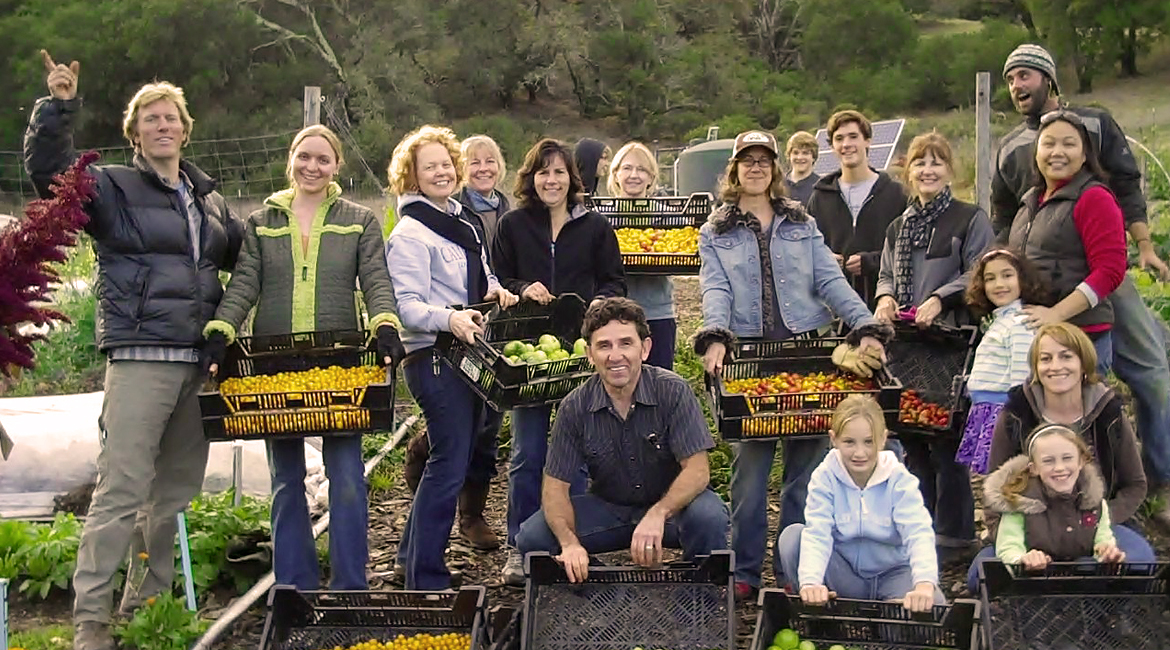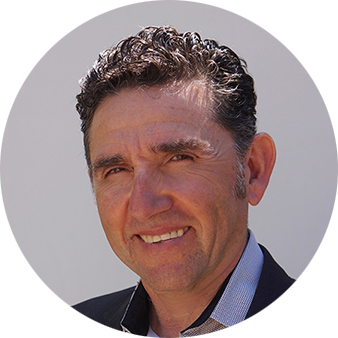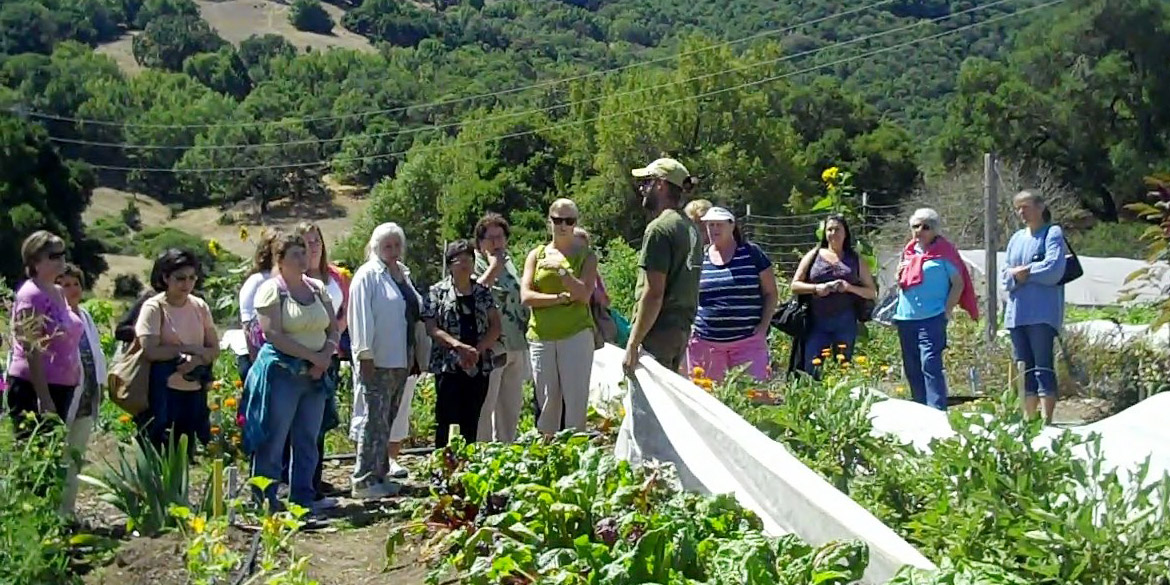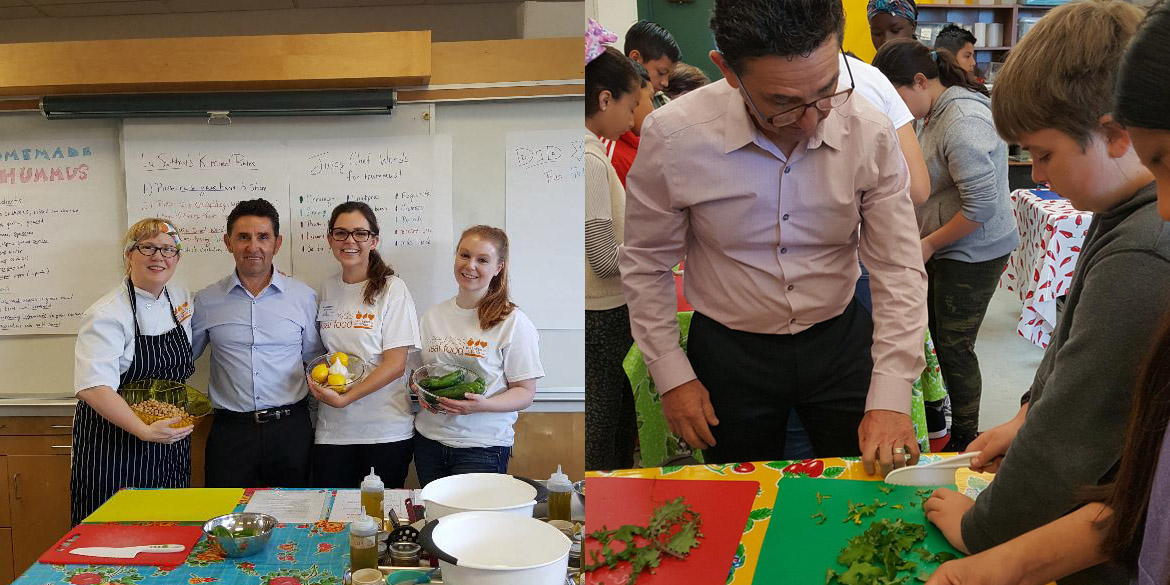Seeds of Change: Miguel Villarreal

 Every lunch line needs a hero like Miguel Villarreal, from Novato School District in Northern California. His infectious passion to transform school cafeteria menus to be vehicles of vibrant health through the school lunch program has us fired up over here at OMD. He’s the Food Service Director of our dreams, and his mission to bring freshness and more plants to kids’ plates is a model of creativity, perseverance and collaboration for others around the country. OMD is thrilled to share this interview with Miguel.
Every lunch line needs a hero like Miguel Villarreal, from Novato School District in Northern California. His infectious passion to transform school cafeteria menus to be vehicles of vibrant health through the school lunch program has us fired up over here at OMD. He’s the Food Service Director of our dreams, and his mission to bring freshness and more plants to kids’ plates is a model of creativity, perseverance and collaboration for others around the country. OMD is thrilled to share this interview with Miguel.
Was there a situation, event or experience that led you to start connecting food and planet?
I encountered a lot when I was first hired as as Novato School District’s Food Service Director. For example, I quickly learned that there was NO local produce being offered to the students participating in the school meal programs and that obesity rates were about 34 percent! There was also lots of junk food still being served to the students– sodas, pastries, sugary cereals, chocolate milk and more. This felt very odd considering that Marin County is the mecca of organic farming.
All of these experiences made me realize that every decision we make about food has an impact on our health, the planet and animals.
What was happening? Did you have resistance? How did you navigate this?
I knew something was terribly wrong, but I also knew that I did not have all the answers to improve the culture of nutrition and wellness in our schools and community. So, I reached out to farmers, health professionals, parents, teachers, non-profit organizations and others to learn more.
After, I started making changes to the menu. We started purchasing local produce and dairy and phasing out junk food. Eventually, I managed to eliminate all red meat from Novato School District menus in 2008. A change from the average of 1,000 pounds of red meat served per week in our school meal program up to that point.
I knew our kitchen staff needed to be informed and invested in these changes, so I started holding our annual staff meetings at local farms. My staff started learning through their own experiences and talked with the farmers. This helped our team understand the direct connection between our farms and the work we were doing to improve our local food system.

How have you handled tensions with communities whose way of life is deeply connected with the meat and dairy industry?
This actually happened in 2008 when I recommended to our School Board that we eliminate red meat. The Superintendent at the time thought I had lost my mind. I was reminded that we live in a farming community and that the cattle farmers may be upset. I told the Superintendent to have anyone who felt this way to call me directly.
One farmer actually did call. The conversation lasted no more than 10 minutes and he quickly understood that we were on the same page. The red meat we were purchasing was low grade and potentially contaminated with hormones and antibiotics and the District didn’t have budget to buy his premium grass fed beef. At the end, he clearly understood that I had the best intentions of our children in mind.
"All of these experiences made me realize that every decision we make about food has an impact on our health, the planet and animals. "
Can you recall a time when you first started feeling the effects of being plant-based?
I had never considered being plant-based until I read T. Colin Campbell’s The China Study. In the book, Dr. Campbell refers to many professional and Olympic athletes that had thrived while living plant-based. I had been an avid cyclist my entire life and had competed in many cycling events– except for 200-mile rides. As a meat eater, I had tried and failed for years to finish a 200-mile ride. I had the will, but my body could not handle more than 8 hours on a bike.
But I was able to finish my first 200 mile bike ride after just 2 months of being plant-based. That same year, I completed my second 200-mile bike ride (the most challenging in the state of California). I attribute this all to my lifestyle.
Is there a specific kind of food you want to mention as being the “gateway drug” for adapting more plant-based food in your life?
I never cared for Indian curries, but today, I enjoy eating many Asian dishes. I’m constantly amazed by all the delicious meals I eat that are completely plant-based.
I also remember enjoying hamburgers as a meat eater. Today, I’m always in search of the best veggie burger made from scratch.
In the end, I’m glad that each and every meal I eat has a positive impact on my health, animals and the planet.
What remains challenging, if anything, about being plant-based?
There is still work to do. I keep stepping back and reminding myself that although we have not completely eliminated meat, we have reduced animal products from our menus.
I always ask myself these questions: How can we get more school food service programs to move toward a plant-based menus for children? How can we get more families to serve more plant-based meals at home? How can the community support us?

How being plant-based changed your life?
My wife has told me over the years since I’ve been plant-based that the person she knows today is not the same person she met all those years ago. She has seen and experienced my identity change for the better of humanity. I know more than ever that my values are far more aligned with my passion for the health and wellness of everyone and everything.
For More
Inspired by Miguel’s story? Sign up for our Newsletter for more spotlights on the seeds of the movement.


